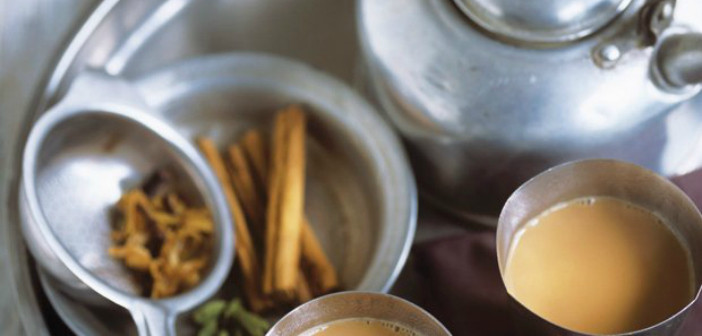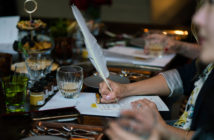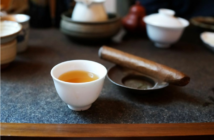They’ve spent years developing the perfect balance of spice and sweet for a tantalizingly warm chai concentrate. They’ve traveled to the mountains of India to find the one place where their chai could be flash-dried to a hot water-soluble powder. They’ve sold from food carts and bike trailers and started their distribution with a single store. These are America’s chai sellers.
Devotion to chai is spreading across the country, making its way out of the coffee shops to grocery stores and people’s stovetops. Committed coffee drinkers are replacing their usual morning brew with the energizing kick of black tea combined with the power of ginger, cardamom, cloves, and milk.
Ricardo Da Costa of Yogic Chai can speak firsthand about the attraction of chai for the coffee set. When he started Yogic he sold his tea from his “chai cycle,” a trailer attached to a bicycle that he rode to commuter train stations in New Jersey. Then he was offered a permanent space in one of the stations that had previously been run by a coffee seller. “We offered coffee because it was important for commuters but we kept giving out samples of chai. Within two years, 60% of the coffee drinkers had switched to chai.”
The appeal is echoed by Julian Fields, General Manager of Oregon’s Sattwa Chai. Founded in 1995, Sattwa was one of the early entrants to the American chai market. “The blend of spices with black tea gives you energy in the morning like coffee, but it’s more balanced.” It is no accident that their original distribution route was through coffee roasters across the country.
These innovative chai blenders have found a myriad of ways to share the flavors they love. After a three month trip to India, Brook Eddy of Bhakti Chai in Boulder, Colo. craved the fiery spice and taste of real ginger she found in chai there. She rented space in a little commercial kitchen and brewed chai once a week, doing all the purchasing, brewing, sales and marketing herself. After selling it in gallon jugs out of the back of her car she brought a mason jar-type container to her local Whole Foods and they agreed to stock it at one store. Bhakti now has its own 4500 sq. ft. brewery where they press 1600 lbs. of organic ginger for chai every week.
Sarah Adams of Chico, Calif.-based Chico Chai was captivated by the drink during her college days and enlisted a friend to introduce her to the exotic spices and brewing styles. “I found that not only did I love drinking chai, but I loved the process of brewing chai, the preparation of spices, waiting patiently while it simmered, letting the smell fill my house.” Adams began brewing a few gallons a week, beginning with just one client her first week. Nine years later she has increased her distribution throughout her northern California region but she insists on doing the brewing and blending herself.
While there are many loose leaf blends and concentrates on the market, Blue Lotus Chai of Eugene, Ore. offers a chai unlike what most tea drinkers have ever seen. When owner Barbara Skolnick Cameron, a frequent visitor to India, decided to get into the business, she wanted a chai with bold authentic flavors that was quick to prepare. “We went to India and located in the mountains a facility that actually takes a brewed tea and flash dries it into powder. We ended up with this beautifully sexy maroon powder with six organic spices that is hot water soluble. It only takes 1/4 teaspoon to make a cup of chai.”
Whether loose leaf blends, concentrate or flash-dried powder, all of these chais have something in common. These chai sellers seek to create authenticity by respecting chai’s basic roots. “Indian chai is based on a formula of masala and masala needs balance — sweet, spicy, depth,” says Arizona-based Maya Tea Company’s Manish Shah. “We’re open to inventiveness and exploration but we don’t want to trample on the traditions established before us.”
Classic and not so classic additions
Tea companies now offer a dizzying array of chai blends. An authentic chai, however, has a few particular elements that make it true to its origins. The base is a good black tea, typically Assam CTC. It will include ginger, cardamom, cloves, and often cinnamon. It will be prepared with a high-fat content milk and will be slightly sweetened. Even within India, however, there are regional differences, says Paawan Kothari of The Chai Cart in San Francisco. In the north, more cardamom is used, while in western India, cloves are more prominent. In the state where Mumbai is located, fresh mint and lemongrass are frequent additions. Chai drinkers will note differences in flavors when dried ginger is used versus fresh ginger or when black pepper or even saffron is incorporated. Companies are developing chai blends with other bases including Rooibos and even white tea which aim to express the same flavors and feel of traditional chai with a new twist.
Ready to explore chai? Check out:
Bhakti Chai – Concentrate – www.bhaktichai.com
Big Train – dozen mixes – www.bigtrain.com
Blue Lotus Chai – Flash dried tea powder – www.bluelotuschai.com
Cafe D’Vita – three chai latte mixes – www.caffedivita.com
Chico Chai – Concentrate (N. Calif. only) and loose tea – www.chicochaitea.com
David Rio – eight mixes – www.davidrio.com
Jaipur Avenue – five mixes – www.jaipuravenue.com
Maya Chai – Concentrate and loose tea – www.mayatea.com
Rishi Tea – Organic loose leaf – www.rishi-tea.com
Oregon Chai – mixes, concentrates, bags – www.oregoncafe.com
Sattwa Chai – Concentrate – www.sattwachai.com
SerendipiTEA – Loose tea – www.serendipitea.com
Tazo – loose leaf, bags, latte concentrate – www.tazo.com
The Chai Company – four concentrates – www.chaico.com
Tipu Chai – mixes, loose leaf & concentrate – www.tipuschai.com
Yogic Chai – Loose tea – www.yogicchai.com




